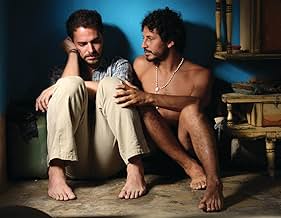CALIFICACIÓN DE IMDb
7.7/10
7.4 k
TU CALIFICACIÓN
Una inusual historia de fantasmas ambientada en la costa peruana; un pescador casado lucha por conciliar su devoción por su amante masculino con las estrictas tradiciones de su pueblo.Una inusual historia de fantasmas ambientada en la costa peruana; un pescador casado lucha por conciliar su devoción por su amante masculino con las estrictas tradiciones de su pueblo.Una inusual historia de fantasmas ambientada en la costa peruana; un pescador casado lucha por conciliar su devoción por su amante masculino con las estrictas tradiciones de su pueblo.
- Dirección
- Guionista
- Elenco
- Premios
- 13 premios ganados y 13 nominaciones en total
Humberto Cavero
- Padre Juan
- (as Julio Humberto Cavero)
Liliana Alegría
- Carlota
- (as Liliana Alegria Saavedra)
Tomas Fernandez
- Sabino
- (as Tomás Fernández)
- Dirección
- Guionista
- Todo el elenco y el equipo
- Producción, taquilla y más en IMDbPro
Opiniones destacadas
Contracorriente (Undertow) is simply a gem of beautifully shot pictures, perfectly cast actors, an extraordinarily well written script and masterful direction.
I did not initially expect Contracorriente to be a movie that would haunt me for days after watching it, as it seemed to be a perfectly straight forward story judging from the text on the back of the DVD-case. I was even a bit worried that it might be cliché or simply cheesy. It was not however. Not more than a few minutes into the movie I started to suspect that I might have grossly misjudged the nature of the film and I was happy to be proved wrong.
The locations, the people, the acting, the language were all so beautiful and the very delicate and slowly evolving story made for so much more than simple entertainment. Especially the subtle hint of possibility in the ending left a very warm and hopeful feeling but the movie as a whole makes a very strong and lasting impression.
I was very moved by this movie and the very strong statement that it makes and a variety of the most beautiful and strong scenes have stayed in my thoughts for days on end for both the sad parts and the joyous moments.
I can only recommend that you watch it if you haven't already - and I am looking forward to seeing it again soon myself and expect it to be something that I will do more than once.
I did not initially expect Contracorriente to be a movie that would haunt me for days after watching it, as it seemed to be a perfectly straight forward story judging from the text on the back of the DVD-case. I was even a bit worried that it might be cliché or simply cheesy. It was not however. Not more than a few minutes into the movie I started to suspect that I might have grossly misjudged the nature of the film and I was happy to be proved wrong.
The locations, the people, the acting, the language were all so beautiful and the very delicate and slowly evolving story made for so much more than simple entertainment. Especially the subtle hint of possibility in the ending left a very warm and hopeful feeling but the movie as a whole makes a very strong and lasting impression.
I was very moved by this movie and the very strong statement that it makes and a variety of the most beautiful and strong scenes have stayed in my thoughts for days on end for both the sad parts and the joyous moments.
I can only recommend that you watch it if you haven't already - and I am looking forward to seeing it again soon myself and expect it to be something that I will do more than once.
" Undertow", gut-wrenching and quietly powerful Peruvian movie, brings back the faith in the power of story telling. This forgotten art seems to have passed by most of our contemporary film-makers. Luckily it didn't Javier Funtes-Leon. Small fishing village seemingly locked in time capsule. Grueling work, old-time believes, church on Sundays and communal meal after. Everybody knows everybody, or do they? Small towns, like little tribes, include all members of its community.Up to a point. As long as you play by their traditional rules, you'll be fine. But, just try to step out of the rhythm of the tribal tune, and they turn on you. Of course, this is a movie about a repression of gay people and the horrors they have to endure just because they are different. But, it is so much more. The indictment of empty traditions, false morals and greatest possible cheer for personal courage. This is the life we have, these are the cards we are dealt and play we must.With our head up high and damn the consequences, or hiding and trying to please all but yourself. Doesn't seems such a hard choice to me, or is it?
One of the best new films exploring gay male identity, love and relationships, and likely will be a worthy addition to many personal "favorite gay films" lists, although the fact that the film is set in a town, and to some extent a culture, where, at least for a large part of the story, many in the town have not yet evolved in their views of LGBT people and issues, created some (ultimate unnecessary) anxiety for me early in the film, and at parts throughout, as to whether the film would be a throwback to older, more stereotyped and limited representations and stories of gay life, although those anxieties were not only relieved by the end of the film, but, as I suggested, the film is an extremely valuable addition to the new wave of gay cinema.
The writer, director, casting director and cast, cinematographer, set designer and other members of the film-making team also do a great job exploring rural, small town life, with its traditions (religious and otherwise...) superstitions, and class differences, and the interplay among the individuals, families and community who inhabit the town, along with the welcome (or rejection...) given to a stranger who comes there, and who many perceive as a threat to the social fabric of the town, and the support (or lack of it...) the townspeople and characters show to each other, ultimately examining the struggle between bigotry and ignorance, on the one hand, and the struggle to overcome that bigotry and ignorance, and replace it with support, respect and love on the other. Most of the townspeople are not financially well-off, but make just enough to get by, working in occupations connected to fishing and the sea, and the way they relate, individually and as a community, to each other (and to themselves, in regard to what is the true definition of a man, of an individual's self-respect) in light of a newcomer who is more financially well-off, and his artistic and suspected sexual/relationship interests, are additional themes of the film, which play out so well in a beautiful, interesting and captivating way, often evoking strong emotions, and at times offering an inspiring catharsis (and perhaps a few tears, in reaction to some sadness, and much beauty.)
And there are many other highlights of the film beyond all that, including the amazingly beautiful setting, in a rural, seaside Peruvian village, the cinematography, musical score, performances, plot twists and turns, the mix of fantasy and reality (and moments where it's unclear to what extent fantasy exists as an aspect of the story's reality.) This is a truly unique and creative film, and one of the most rewarding experiences I've had at a feature film in a long time.
The writer, director, casting director and cast, cinematographer, set designer and other members of the film-making team also do a great job exploring rural, small town life, with its traditions (religious and otherwise...) superstitions, and class differences, and the interplay among the individuals, families and community who inhabit the town, along with the welcome (or rejection...) given to a stranger who comes there, and who many perceive as a threat to the social fabric of the town, and the support (or lack of it...) the townspeople and characters show to each other, ultimately examining the struggle between bigotry and ignorance, on the one hand, and the struggle to overcome that bigotry and ignorance, and replace it with support, respect and love on the other. Most of the townspeople are not financially well-off, but make just enough to get by, working in occupations connected to fishing and the sea, and the way they relate, individually and as a community, to each other (and to themselves, in regard to what is the true definition of a man, of an individual's self-respect) in light of a newcomer who is more financially well-off, and his artistic and suspected sexual/relationship interests, are additional themes of the film, which play out so well in a beautiful, interesting and captivating way, often evoking strong emotions, and at times offering an inspiring catharsis (and perhaps a few tears, in reaction to some sadness, and much beauty.)
And there are many other highlights of the film beyond all that, including the amazingly beautiful setting, in a rural, seaside Peruvian village, the cinematography, musical score, performances, plot twists and turns, the mix of fantasy and reality (and moments where it's unclear to what extent fantasy exists as an aspect of the story's reality.) This is a truly unique and creative film, and one of the most rewarding experiences I've had at a feature film in a long time.
I haven't seen such a touching gay movie since Brokeback Mountain. The movie contains so many issues, yet it could still cover them all and touch the deepest emotions in my heart. The depiction of each character is so profound that you can't help feeling the way they experienced.
Everyone is selfish when it comes to love, and so was Miguel. After he found the way how his wife and Santiago could coexist, he decided not to salvage the body and let Santiago rest in peace. He wanted Santiago to exist just for him, without the risk their relationship to be discovered. But not soon after the rumor of the painting ran wild in the village, his ideal pattern of coexistence vanished! In substitution, here comes the suspicion along with the despite from the so-called innocent village. Miguel's wife is just an ordinary woman who couldn't accept the fact that her husband was screwing other man, but the courage and tolerance she maintained is quite extraordinary. Love is the only way to get through this kind of grief. It's true for Miguel for that the loss of his lover and the courage to admit the rumor. On the other hand, it's also true for Miguel's wife who had to raise her child under this circumstance, not to mention the pressure and gossip she had to put up with.
Masculinity is always a main concept in gay movies. Therefore, Miguel had to struggle with his identification like most conservative gay did. In some way, Santiago is not just his lover, but also the desire of freedom which he had been longed for decades. When Miguel made up his mind to fulfill Santiago's last wish no matter what it costs, the determination and courage he showed really made me weep. No doubt that's the moment he found his own freedom and became a true macho!
Tragedy is when love no longer existed, so I would rather say this movie is about love and forgiveness. For those who has been struggled for their identification, this is a must see movie. Furthermore, for those who be the reason some have to struggle for anything, this is definitely a movie you can' t miss!
Everyone is selfish when it comes to love, and so was Miguel. After he found the way how his wife and Santiago could coexist, he decided not to salvage the body and let Santiago rest in peace. He wanted Santiago to exist just for him, without the risk their relationship to be discovered. But not soon after the rumor of the painting ran wild in the village, his ideal pattern of coexistence vanished! In substitution, here comes the suspicion along with the despite from the so-called innocent village. Miguel's wife is just an ordinary woman who couldn't accept the fact that her husband was screwing other man, but the courage and tolerance she maintained is quite extraordinary. Love is the only way to get through this kind of grief. It's true for Miguel for that the loss of his lover and the courage to admit the rumor. On the other hand, it's also true for Miguel's wife who had to raise her child under this circumstance, not to mention the pressure and gossip she had to put up with.
Masculinity is always a main concept in gay movies. Therefore, Miguel had to struggle with his identification like most conservative gay did. In some way, Santiago is not just his lover, but also the desire of freedom which he had been longed for decades. When Miguel made up his mind to fulfill Santiago's last wish no matter what it costs, the determination and courage he showed really made me weep. No doubt that's the moment he found his own freedom and became a true macho!
Tragedy is when love no longer existed, so I would rather say this movie is about love and forgiveness. For those who has been struggled for their identification, this is a must see movie. Furthermore, for those who be the reason some have to struggle for anything, this is definitely a movie you can' t miss!
This film was the "buzz film" at Frameline, the San Francisco LGBT film festival. It is now in very limited commercial release. I saw it for the second time this week and it's as powerful on the second viewing as the first. It's beautifully filmed in a stunningly picturesque Peruvian fishing village. It features tender and complex performances by the actors in the lead roles, and wonderful authentic performances by native residents of the village location. The story delivers a powerful study in internal conflict, grief, redemption, and the power of love. The director says that the idea for the story came from a screen writing-class assignment to write a scene that happens in a kitchen. The kitchen scene is indeed pivotal to the story, but the moral intricacy of the tale surrounding that scene is testament to a creative genius that you will want to hear more from. You will want to see this film again, and you will want your friends to see it, because the world needs more filmmakers like this.
¿Sabías que…?
- TriviaAlthough both main characters are Peruvian, the actors who play them are not. Cristian Mercado (the Fisherman) is Bolivian and Manolo Cardona (the Photographer) is Colombian.
- ConexionesFeatures Direito de Amar (1987)
Selecciones populares
Inicia sesión para calificar y agrega a la lista de videos para obtener recomendaciones personalizadas
- How long is Undertow?Con tecnología de Alexa
Detalles
- Fecha de lanzamiento
- Países de origen
- Sitios oficiales
- Idioma
- También se conoce como
- Undertow
- Locaciones de filmación
- Productoras
- Ver más créditos de la compañía en IMDbPro
Taquilla
- Total en EE. UU. y Canadá
- USD 108,620
- Fin de semana de estreno en EE. UU. y Canadá
- USD 6,749
- 19 sep 2010
- Total a nivel mundial
- USD 602,059
Contribuir a esta página
Sugiere una edición o agrega el contenido que falta























